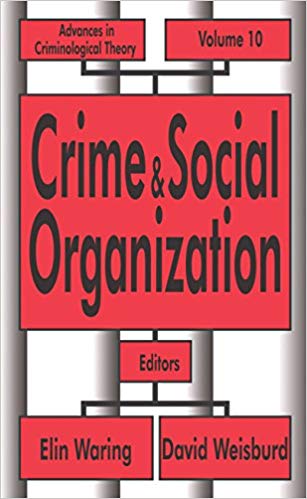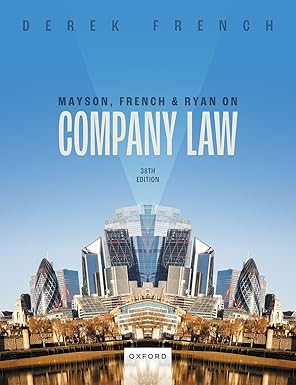This tenth volume in the Advances in Criminological Theory series is dedicated to the work of Albert J. Reiss, Jr. It focuses on the relationship between crime and social organization that is so central to his work. This focus rejects a view of crime solely as the action of atomistic individuals and sees the criminal justice system as inseparable from its social, political and organizational context. This perspective has had a resurgence in recent years, and this volume brings together some of the most important scholars who have contributed to these developments. Articles examine the social organization of crime itself, the context of crime, and the response to crime. The concept of co-offending, originally developed by Reiss, is explored both as a way of improving understanding of juvenile offending and as a framework for understanding patterns of criminal organization across crime types and the relationship of criminal to licit organization. Other articles recast social disorganization theory in light of recent theoretical and empirical developments. They argue for a version of control theory that incorporates internal, contextual, and state-focused dimensions. Organizational actors, both as offenders and as governmental agencies responding to crime, are explored. Building from Reiss's groundbreaking work on policing, a group of articles on policing examine organizational change through reorganization, the adoption of strategies such as community policing and the increased use of empirical evidence, complicated by routines, organizational culture and political constraints. Taken together, these works develop new connections between dimensions of social organization and renew the social organization perspective on crime and criminal justice. Contributors include: Diane Vaughan, Joan McCord, Kevin P. Conway, Elin Waring, Felton Earls, Beat Mohler, Peter Manning, Stephen Mastrofski, Lawrence Sherman, David Weisburd, Robert Sampson, David F. Greenberg, Margaret Kelley, Robin Tamarelli and Jeremy Travis.
چکیده فارسی
این جلد دهم از مجموعه پیشرفتهای نظریه جرمشناسی به کار آلبرت جی ریس، جونیور اختصاص دارد. این جلد بر رابطه بین جرم و سازمان اجتماعی تمرکز دارد که در کار او بسیار مهم است. این تمرکز، دیدگاه جرم را صرفاً به عنوان کنش افراد اتمی رد می کند و نظام عدالت کیفری را از بافت اجتماعی، سیاسی و سازمانی آن جدایی ناپذیر می داند. این دیدگاه در سالهای اخیر تجدید حیاتی داشته است و این جلد برخی از مهمترین محققانی را که در این تحولات مشارکت داشتهاند گرد هم میآورد. مقاله ها سازمان اجتماعی خود جرم، زمینه جرم و واکنش به جرم را بررسی می کنند. مفهوم جرم مشترک، که در اصل توسط ریس توسعه داده شد، هم به عنوان راهی برای بهبود درک بزهکاری نوجوانان و هم به عنوان چارچوبی برای درک الگوهای سازمان مجرمانه در انواع جرم و رابطه سازمان مجرمانه با سازمان قانونی مورد بررسی قرار می گیرد. مقالات دیگر نظریه بیسازمانی اجتماعی را در پرتو تحولات نظری و تجربی اخیر بازنویسی میکنند. آنها برای نسخه ای از نظریه کنترل استدلال می کنند که ابعاد داخلی، زمینه ای و متمرکز بر دولت را در بر می گیرد. بازیگران سازمانی، هم بهعنوان مجرم و هم بهعنوان سازمانهای دولتی در واکنش به جرم، مورد بررسی قرار میگیرند. گروهی از مقالههای مربوط به پلیس، با تکیه بر کار پیشگامانه ریس در مورد پلیس، تغییرات سازمانی را از طریق سازماندهی مجدد، اتخاذ استراتژیهایی مانند پلیس جامعه و افزایش استفاده از شواهد تجربی، پیچیده شده توسط روالها، فرهنگ سازمانی و محدودیتهای سیاسی مورد بررسی قرار میدهند. در مجموع، این آثار پیوندهای جدیدی را بین ابعاد سازمان اجتماعی ایجاد می کنند و دیدگاه سازمان اجتماعی را در مورد جرم و عدالت کیفری تجدید می کنند. مشارکتکنندگان عبارتند از: دایان وان، جوآن مککورد، کوین پی. تراویس.
ادامه ...
بستن ...
Ebook details:
عنوان: Crime and Social Organization (Advances in Criminological Theory)
نویسنده: Elin Waring, David Weisburd
ناشر: Transaction Publishers; 1 edition (December 24, 2001)
زبان: English
شابک: 0765800640, 978-0765800640
حجم: 16 Mb
فرمت: True Pdf
ادامه ...
بستن ...










